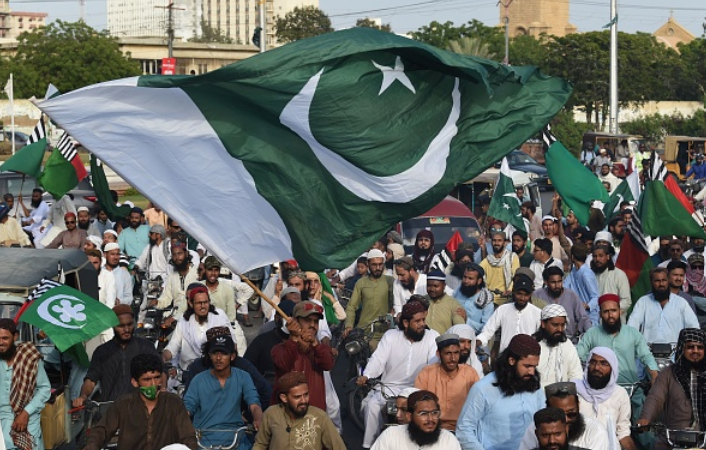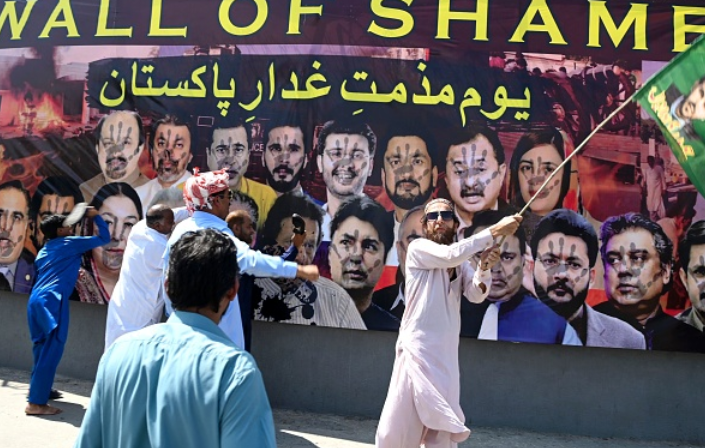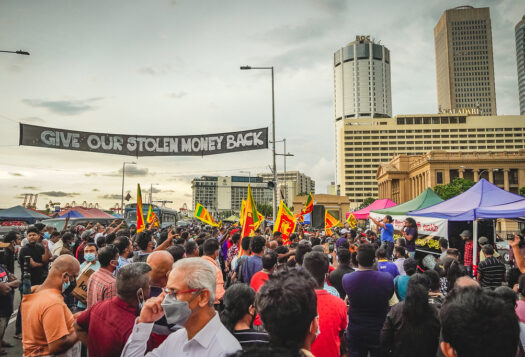
The May 9 arrest of former Prime Minister Imran Khan on corruption charges sent shockwaves throughout Pakistan, magnified further by attacks on army installations during violent protests across the country. Adding to the intensity, an anti-terrorism court in Lahore handed 16 civilians over to the military for trial for their suspected involvement in recent violent protests, culminating in another breakdown in civil-military ties. A nationwide crackdown has resulted in the arrest of hundreds of Khan’s supporters and journalists, stifling dissent and raising concerns about the suppression of voices critical of the government.
Pakistan finds itself at a critical juncture. The fallout of Imran Khan’s arrest and attacks on military installations triggered a significant rift within the Pakistan Tehreek-e-Insaf (PTI), leading dozens of former PTI legislators to distance themselves from Khan. However, the growing power struggle between Khan’s PTI and the powerful military establishment is anything but over as both sides vie for control and influence ahead of elections later this year.
The growing power struggle between Khan’s PTI and the powerful military establishment is anything but over as both sides vie for control and influence ahead of elections later this year.
As the potential consequences of this clash threaten to undermine principles of civilian supremacy, the country continues to grapple with economic default and surging terrorism during intensified political turmoil. These multifaceted challenges have created a daunting domestic environment, casting doubt on the nation’s ability to navigate the storm unscathed.
Amid Crisis, Governance at a Standstill
In the lead-up to Imran Khan’s arrest, Pakistan faced multiple crises. Following a vote of no confidence that removed Khan from office in April 2022, a political tug-of-war erupted between the PTI and the coalition government, with the military establishment playing a significant role. This impasse has paralyzed effective governance and eroded public trust in democratic processes. Furthermore, Pakistan’s economy teeters on the edge of collapse, grappling with soaring inflation and feeble growth rates. There are growing concerns that the nation could default on its external debts if delayed disbursements from the International Monetary Fund (IMF) are not unlocked.
This power struggle has “created a seismic shift” in Pakistani politics. As the nation grapples with its worst economic crisis in decades and a surge in terrorist activities, the road ahead appears fraught with challenges. With elections on the horizon, Pakistan stands at a crucial crossroads, where the decisions made will shape its future.

The political power struggle has brought governance to a standstill and barred crucial decisions regarding the country’s future from taking place. With the PTI led by Imran Khan engaged in a fierce struggle against the Pakistan Democratic Movement (PDM) coalition government under Prime Minister Shehbaz Sharif and the powerful military establishment, Pakistan’s leaders proved unable or unwilling to attend to the country’s crises. For instance, Pakistan is struggling with a severe balance of payments crisis, with significant repayments due to various private, multilateral, and bilateral lenders. In the fiscal year 2024-25, Pakistan is projected to face debt servicing obligations amounting to approximately $24.6 billion. This includes $8.2 billion for long-term debt repayments and an additional $14.5 billion earmarked for short-term debt repayments. Notably, a significant portion of these payments, about $3.8 billion, is due to Chinese lenders.
Simultaneously, Pakistan seeks to resume its loan program with the IMF, which has stalled due to the country’s inability to comply with the IMF’s stipulated conditions. The ongoing crisis complicates these negotiations, making it even more challenging for Pakistan to persuade the IMF and perhaps even Chinese leaders — who have publicly advocated for political stability in Pakistan — to offer the required financial assistance.
Current political upheaval will also hamper the efforts of security forces to build nationwide agreements in combating terrorist organizations and obtaining political backing for counterterrorism initiatives. Terrorist groups in Pakistan, particularly Tehreek-e-Taliban Pakistan (TTP) and Baloch separatists, will likely exploit security fissures leading to terrorism and insurgency intensification. The potential clash between civilian and military institutions looms large, posing a grave threat to Pakistan’s democratic fabric and institutional cohesion.
The situation remains uncertain as Pakistan approaches the upcoming general elections scheduled for later this year. The failure to hold elections in Punjab and Khyber Pakhtunkhwa after the dissolution of provincial assemblies has opened a constitutional loophole that could prolong Shehbaz Sharif’s tenure as prime minister. The inability of the chief justice of Pakistan to enforce timely elections in Punjab and Khyber Pakhtunkhwa, coupled with allegations of collusion among the government, military, and election commission, raises serious doubts about the integrity and transparency of the electoral process.
A Call to Action
The voice of the people is at stake and the future of democracy in Pakistan hangs in the balance. In addition to the political unrest, Pakistan faces an alarming surge in security threats. Startling statistics reveal that in 2022, Pakistan experienced the second-largest increase in terrorism-related deaths worldwide, while in the first half of 2023, it already witnessed an evident surge in terrorist attacks that claimed nearly 300 lives. The terrorism intensification poses a severe challenge to Pakistan’s security and stability. Addressing these security challenges is paramount to safeguarding the nation and restoring peace.
By providing assistance and advocating for democratic governance, the global community can help Pakistan weather the storm.
Amidst the embroiling political quagmire, Pakistan finds itself at a precipice where astute and inclusive leadership is crucial to navigating the turbulent times. All political stakeholders must rise above personal interests and prioritize the nation’s welfare. Meaningful dialogue, inclusivity, and a firm commitment to democratic principles are fundamental in restoring stability, rebuilding trust, and charting a path toward economic recovery. The international community must also be vital in supporting Pakistan’s fledgling democracy. By providing assistance and advocating for democratic governance, the global community can help Pakistan weather the storm.
The road ahead is challenging, but by embracing democratic values and working collectively, Pakistan can overcome its hurdles and embark on a prosperous and secure future.
Also Read: SAV Q&A with Cyril Almeida – Imran Khan’s Arrest and Implications for Pakistan’s Future
***
Image 1: Asif Hassan/AFP via Getty Images
Image 2: Farooq Naeem/AFP via Getty Images


